Table of Contents
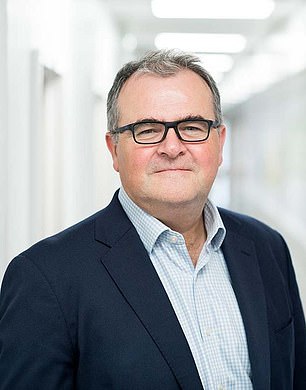
Nanoco CEO Brian Tenner is aiming for major growth after the confrontation with shareholders
“We are in the strongest position we have been in – not just financially, but commercially – in the 20 years since we were founded,” says the CEO of British technology pioneer Nanoco.
Since Brian Tenner joined the London-listed company in August 2018, initially as Chief Operating Officer, he has weathered Nanoco’s potentially fatal experience with the pandemic, a protracted legal row with Samsung and an attempted boardroom coup.
But the pandemic is over, Nanoco has received $150 million from a settlement with Samsung, the coup has been crushed and the group is now winning major commercial contracts for the first time.
“It will just be nice to spend more time looking ahead and focusing on positive developments,” Tenner tells This is Money.
Runcorn-based Nanoco makes cadmium-free quantum dot (QD) technology. QDs are tiny particles with a diameter of roughly 10 to 50 atoms – about 1/1000th the width of a human hair – that are capable of absorbing or emitting light of a specific, predetermined wavelength.
Nanotechnology is complex but is an essential part of the modern world and is used in the manufacture of high-tech consumer devices such as TVs and smartphones, as well as in medicine and industry. The QD and QD display market is predicted to be worth $13.1 billion by 2030.
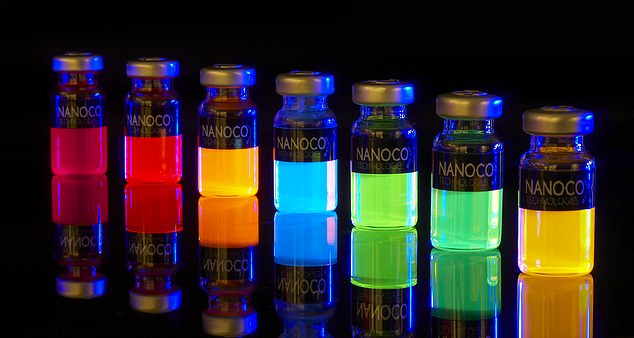

Complex technology: Stored in bottles, the size of QDs determines the color they emit
The Samsung spat and tried to stage a coup
Manchester University spin-out Nanoco claimed Samsung had stolen its unique patented techniques to make the tiny specialized semiconductors.
Nanoco claims that Samsung, with whom it had previously collaborated, then used these QDs in its new range of high-tech QLED TVs. Samsung denies these claims.
But the settlement between Samsung and Nanoco, which fell far short of analysts’ expectations, opened the floodgates for a shareholder row led by Tariq Hamoodi.
Hamoodi called for the ouster of Tenner, chief financial officer Liam Gray and ultimately the entire board for “misrepresenting” the nature and size of the payout.
Shareholders ultimately backed the board, allowing Nanoco to return up to £33m from the Samsung settlement to investors through a £30m offer and a £3m buyback programme. The company will retain the rest with investment plans.
But Hamoodi, who specializes in special situations and process-related market opportunities, is still Nanoco’s fourth largest shareholder with a stake of just over 4 percent.
Tenner says: ‘Ultimately what (Mr Hamoodi) decides to do is what he decides to do – he currently has legal action pending against one of our other shareholders (Lombard Odier) in which we are not involved.
“What (the distribution plan) allows us to do first and foremost is move into a post-litigation world where the focus is on the settlement funds withheld and what we do over the next two to three years.
‘What we want to do now is focus on investments to give us more capabilities, accelerate some of our developments, improve our margins and actually make us a more robust part of the supply chain.
‘In my time at the company we have treated three or four of the largest companies in the world as clients.
“They even joke with us that when we come into their building, their finance guys have to take a break because they’re so worried about our balance sheet.
“The withheld (Samsung settlement) funds end any debate about our robustness as a supplier or even from a shareholder perspective.”
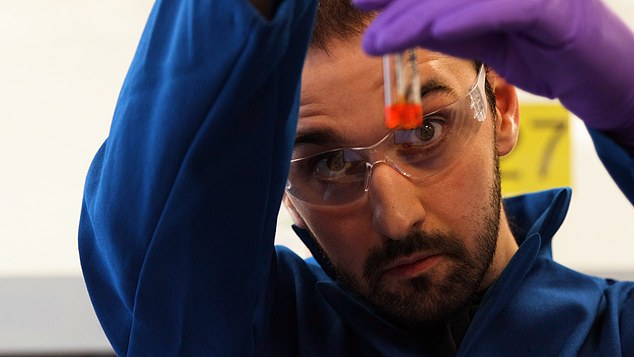

Nanotechnology is complex, but it is an essential part of the modern world and is used in the manufacture of high-tech consumer devices such as TVs and smartphones
And while the size of the settlement disappointed some investors, others were concerned that Nanoco wasn’t keeping enough of the payout for itself, Tenner said.
“Some shareholders actually didn’t want us to give anything back,” he continues.
“Since we had already made the commitment, we felt like we couldn’t go that far.
‘There’s a cautionary tale about small caps in Britain at the moment – it’s very challenging to raise money, and if one of our programs was postponed or something happened and we had to go back to the market for more money, after we just made a lot of money, I don’t think this would be a good message.
‘So we decided to play it safe and that’s why we went for the £33 million.’
Tenner, along with three other board colleagues, have chosen not to participate in the tender at all, but instead “see more value in the medium to long term, rather than cashing in.”
Nanoco has an unusually high number of retail shareholders, with Hargreaves Lansdown and Interactive Investors users being the first and third largest investors respectively.
Many of them speculatively bought shares when the prospect of a Samsung payout loomed, but Tenner says longer-term institutional investors are now more comfortable with the company’s offering.
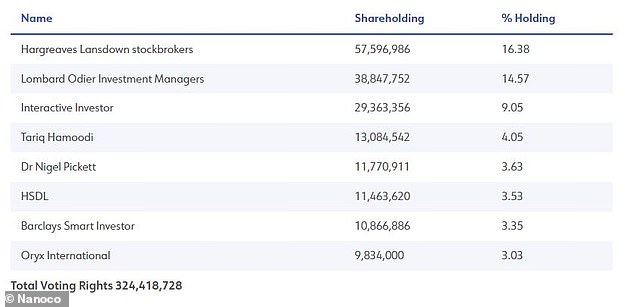

Nanoco has an unusually high number of private shareholders, while Tariq Hamoodi remains the fourth largest investor
Cash neutral next year?
Nanoco more than doubled reported revenue year-on-year to £4 million in the six months to the end of January, driven by recurring intellectual property licensing income, as the company turned to a reported operating profit of £2.4 million after a loss of £2.1 million. million the previous year.
Tenner told shareholders that “after five years of fighting for financial survival,” Nanoco was now in a position to make “prudent but important strategic investments” in new capabilities and its “resilience as a supply chain partner.”

Brokerage Cavendish launched its coverage of the company earlier in March, saying it believes Nanoco is ‘capable of generating £30m to £40m of revenue and an EBITDA margin of 35 to 45 per cent in the medium term’.
It gave the group a price target of 60.2p – almost 190 percent higher than Wednesday’s closing price of 20.9p.
This forecast largely reflects recently unveiled development partnerships with STMicro – a leading supplier of sensors for the smartphone market – and a “key Asian chemical customer.”
Nanoco also most recently reached the critical milestone of its first-ever commercial production order with the shipment of two first-generation materials for use in infrared sensing applications in electronic devices.
Tenner says this could mean a transformation.
“We have shipped enough material that we estimate will be enough for three, four or five million devices over the next twelve months.
“We believe that as soon as a device with this technology is released – whoever launches it – it will brag about it and trumpet it.”
The company has set a target of 2025 as the year it finally becomes cash neutral – a target Tenner accepts doesn’t sound ambitious.
He says, “But if you look around the landscape of quantum dot companies, everyone went bankrupt or got bought out.
“We’re not the last man standing, but it would probably be a world first for a QD company to break even sometime in 2025.”
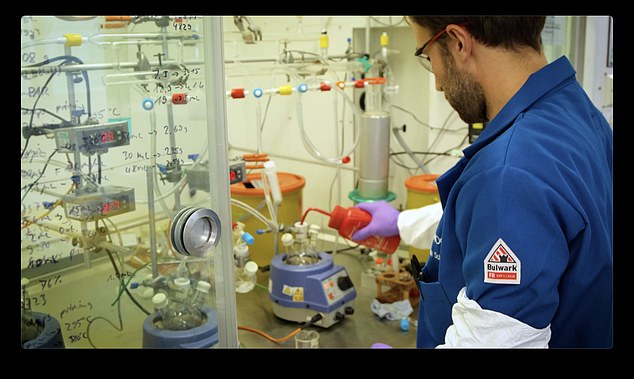

Nanoco says its integrated R&D and manufacturing site is one of the few facilities in the world that can produce cadmium-free QDs at volume and to specification.
The holy grail of the mobile phone
But the holy grail for Nanoco will be getting its technology into a mobile phone, potentially boosting production from a few million units to hundreds of millions of units.
“We would be extremely profitable,” Tenner says.
“We will see this technology in a mobile phone in about 2026.”
It is here that Nanoco distinguishes itself from the competition, according to the boss. The UK-based integrated R&D and manufacturing site is one of the few facilities in the world that can produce cadmium-free QDs at volume and to specification.
Tenner says, “We already have a material shipping facility capable of making more than 500 million sensors.
“We don’t know of any QD company on the sensor side that has both development IP and manufacturing capacity.
‘On the display side, we know a couple that has reasonable production facilities. One is actually bigger than us, but they don’t have intellectual property protection or do much research and development.
“We are in a good place and in a strong position moving forward.”
Some links in this article may be affiliate links. If you click on it, we may earn a small commission. That helps us fund This Is Money and keep it free to use. We do not write articles to promote products. We do not allow a commercial relationship to compromise our editorial independence.
